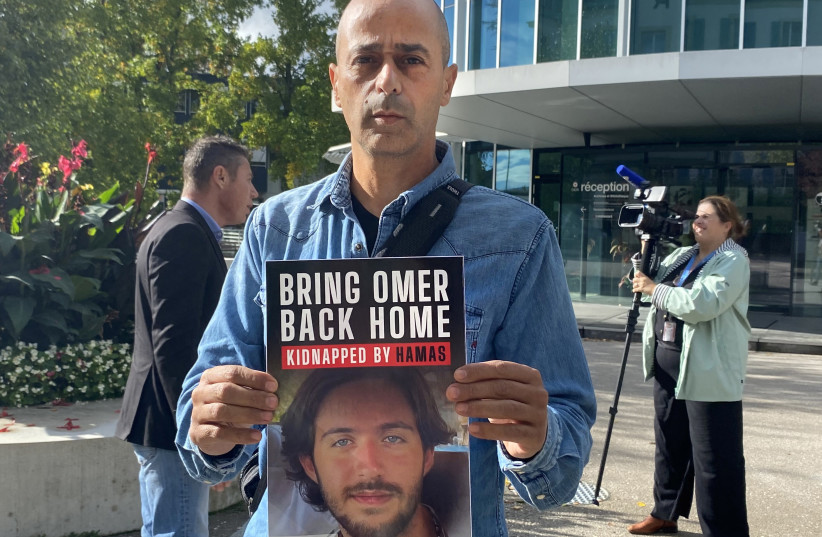The Red Cross's social media apparatus disproportionately focused on the suffering of civilians in Gaza while ignoring the suffering of Israelis since Hamas’s October 7 attack, the Jerusalem Insitute of Justice has found.
JIJ conducted a thorough analysis of the International Committee of the Red Cross’s social media following Hamas's October 7 massacre, in which they murdered 1,200 people and kidnapped over 200 more.
The analysis comes at a time when the Red Cross has been scrutinized heavily for failing to visit Israeli hostages and not reporting that the hostages had been taken to Shifa Hospital.
During the analysis, JIJ reported that they were concerned to find that there were no posts, images, graphics, or videos highlighting the damages suffered by Israel as a result of Hamas or other Palestinian terrorist groups. Neither were there any posts addressing the October 7 tragedy, rockets launched by Hamas indiscriminately at civilian populations, or the hostages kidnapped.
JIJ sends letter to Red Cross president
JIJ sent a letter, signed by hundreds of international bodies, to International Committee of the Red Cross President Mirjana Spoljaris Eggerby.
“We are writing to bring to your attention a pressing issue concerning the use of social media by the International Committee of the Red Cross (ICRC) in the context of the ongoing Hamas-Israel conflict.

“In today's world, social media has an immense influence on the perception of conflicts, shaping narratives and inadvertently affecting conflict dynamics. Recent events have underscored the critical importance of the ICRC's response in this domain," the letter said.
“The central concern at hand revolves around the balance and neutrality of the content disseminated through ICRC's social media channels. As an independent and neutral organization dedicated to upholding humanitarian protection for conflict victims and the principles of international humanitarian law (IHL), it is imperative that ICRC's social media communications maintain a high standard of neutrality, balance, and accuracy in portraying conflicts," they wrote.
“Of particular concern is the apparent disproportion in the content's focus. A noticeable emphasis on the Gaza Strip is evident in the content shared by ICRC on its social media platforms (see Annex 1). This is evident in depictions of scenes from Gaza, casualty statistics, and information about victims within Gaza. However, a significant absence exists concerning content depicting the atrocities committed by Hamas on October 7 and the impact on communities in Israel near the Gaza Strip,' the JIJ wrote.
Furthermore, a notable gap in communication on ICRC's Instagram account was observed following the October 7 attack. While references were made to hostage-taking and the importance of adhering to international humanitarian law, a more robust stance against the violations of international humanitarian law committed by Hamas on October 7, including acts of sexual violence and genocide, was expected.
“Equally concerning is the absence of any posts, whether images, graphics, or videos, addressing the damages suffered on Israeli soil. This encompasses distressing scenes of houses reduced to rubble, charred walls, mass destruction, and the devastating harms caused by rocket hits on civilian infrastructure in Tel Aviv, Ashkelon, and other locations," they said.
“The consequences of this content disproportion are significant, as it affects the overall narrative, public perception, and understanding of the conflict. Given the ICRC's influential role in providing information, it is essential to adopt a more balanced and nuanced approach in social media communications," the letter said.
“From October 7 until October 25, there has been a 500% increase in the volume of antisemitic events compared to the same period last year. Specifically in social networks, the increase of online antisemitic discourse was, between October 7-23, 400% compared to the 17 days prior to the war and 340% compared to the same dates in the previous months ( from 'The State of Antisemitism in the World – A Summary of the First Three Weeks of the 'Swords of Iron' War, 2023').
This alarming surge in online antisemitism has had dire real-world consequences. Instances of antisemitic violence and vandalism have occurred globally, with private houses and apartments in cities like Berlin, Paris, and others being marked with Stars of David. Synagogues, Holocaust memorials, Jewish schools, Jewish cemeteries, and historic Jewish sites in locations such as Girona, Berlin, Vienna, Rome, and Thessaloniki have been targets of attacks, often accompanied by anti-Israel and antisemitic graffiti, including swastikas.
"A particularly distressing incident took place on November 4 when a 30-year-old Jewish woman was stabbed in her home in Lyon, and her attacker defaced her door with a swastika symbol. Tragically, on November 6, a pro-Palestinian protestor killed Paul Kessler, a 65-year-old Jewish man, further underscoring the devastating real-world impact of rising antisemitism," the letter said.
“The perilous connection between online antisemitism and tangible acts of violence against Jewish individuals, communities, and institutions underscores the pressing need for fair and responsible communication on social media platforms. This is why we firmly believe that the ICRC should maintain balance and neutrality in the content shared on social media platforms. Our request is not to remove existing content but to enhance it with a more comprehensive portrayal of the situation, one that encompasses the atrocities committed in Israel by Hamas and other Palestinian terrorist groups.
"Your proactive response to this matter will contribute to a more informed and balanced public discourse on these critical issues.”
